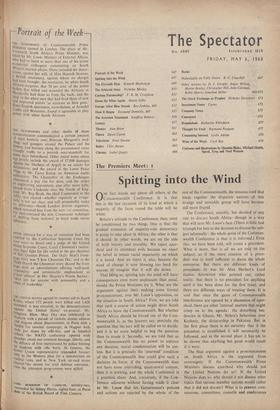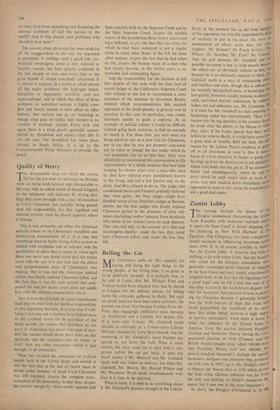The Premiers Meet: I
Spitting into the Wind
ONE fact stands out above all others at the Commonwealth Conference. It is that this is the last occasion of its kind at which a majority of the faces round the table will be white.
Britain's attitude to the Conference, then, must be conditioned by two things. One is that the gradual extension of majority-rule democracy is going to take place in Africa; the other is that it should. In other words, we are on the side of both history and morality. We reject apar- theid and its attendant evils because we reject the belief in innate racial superiority on which it is based. And we reject it, also, because the wind of change is now blowing too hard for anyone to imagine that it will die down.
That being so, spitang into the wind will have consequences even more unpleasant than usual, should the Prime Ministers try it. What are the arguments against their making some formal pronouncement, over Mr. Louw's opposition,.on the situation in South Africa? First, we are told that such a course of action might drive South Africa to leave the Commonwealth. But whether South Africa should be forced out of the Com- monwealth is, as the lawyers say, precisely the question, that the jury will be called on to decide, and it is no more helpful to beg the question than to evade it. Secondly, we are told that as the Commonwealth has no power to enforce any decision, moral condemnation will be use- less. But it is precisely the 'unarmed' condition of the Commonwealth that could give such a decision its force; if the Commonwealth does
not have some overriding, quasi-moral content, then it is nothing, and the whole Conference is a pointless sham. And, conversely, if the Con-
ference adjourns without having made it clear to Mr. Louw that his Government's policies and actions are rejected by the whole of the rest of the Commonwealth, the tenuous cord that binds together the disparate nations of this strange and unwieldy group will have become still more frayed.
The Conference, sensibly, has decided at any rate to discuss South Africa—though in a way
that will save Mr. Louw's face. (There is little real triumph for him in the decision to discuss the sub- ject informally: the whole point of the Common- wealth Conference is that it 'is informal.) Even
this, we have been told, will create a precedent. What is more, that is all we are told on the subject, as if the mere creation of a prece- dent was in itself sufficient to damn the whole enterprise. But there are different kinds of precedents (it was Sir Alan Herbert's Lord Justice Arrowroot who pointed out, rather testily, that there is no precedent for anything until it has been done for the first time), and there are different ways of treating them. It is said that once the gates of Commonwealth interference are opened by a discussion of apar- theid, there are other `internal' matters that might creep on to the agenda: the disturbing ten- dencies in Ghana, Mr. Nehru's behaviour over Kashmir, the dictatorship in Pakistan. But in the first place there is no certainty that if the precedent is established it will necessarily be followed, and in the second place it has yet to be shown that anything but good would result if it were.
The final argument against a pronouncement on South Africa is the argument from sovereignty. If the Commonwealth Prime Ministers discuss apartheid why should not the United Nations . do so? If the United Nations does so, why should it not discuss other topics that, various member nations would rather that it did not discuss? What is to prevent com- missions, committees, councils and conferences of every kind from examining and discussing The internal problems of half the nations in the world? And if they discuss such problems, why should it stop there?
The answer, when allowance has been made for all the exaggerations in the way the argument is presented, is nothing—and a good job, too. National sovereignty, never a very rational or helpful concept, has been greatly weakened in the last decade or two, and every time to the great benefit of almost everybody concerned. It is absurd to suppose, in a world in which almost all the major problems—the hydrogen bomb, prosperity or depression, nutrition, race—are supra-national, and in which the effect of those problems on individual nations is highly com- plex and closely related to their effect on other 'nations, that nations can go on behaving as though what goes on within their borders is no concern of anybody outside. Every now and again there is a fresh proof—generally accom- panied by bloodshed and misery—that this is not the case. The bloodshed has taken place already in South Africa. It is up to the Commonwealth Prime Ministers to provide the proof.







































 Previous page
Previous page